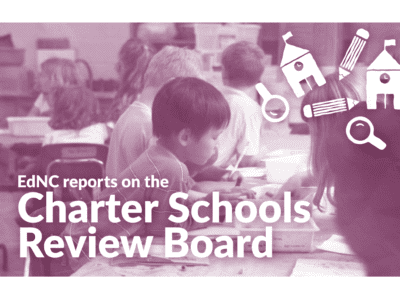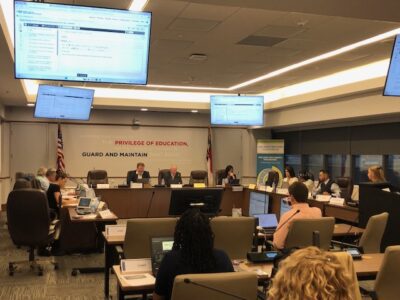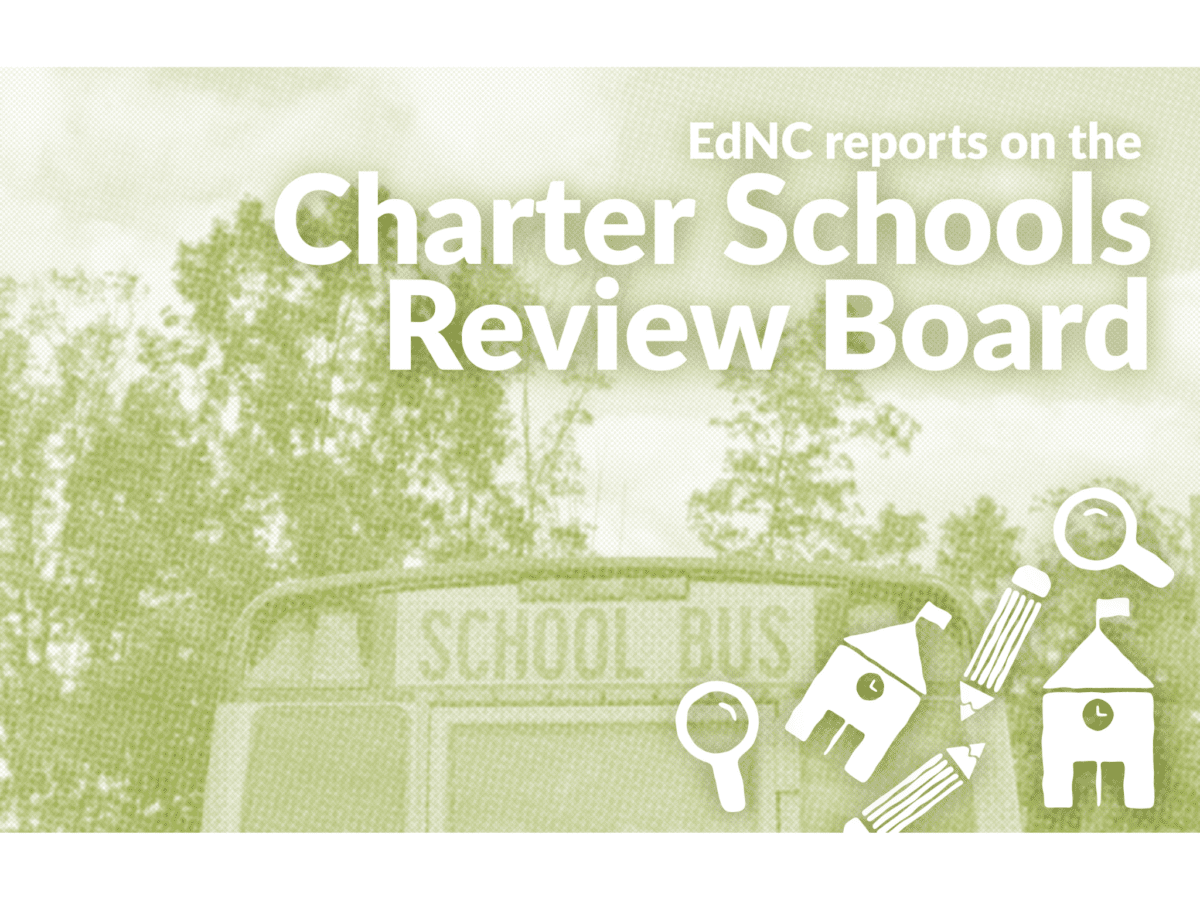
Editor’s note: This article was updated with information from the June 24 specially called meeting.
Seven charter schools have secured final approval from the state’s Charter Schools Review Board to open for the 2025-26 school year, with the CSRB clearing the new schools to open at its monthly meeting on Monday, June 9.
The seven schools are members of this year’s Ready to Open (RTO) charter cohort, which in April included 10 schools. The RTO process includes a planning year that ensures schools meet critical benchmarks — in areas such as enrollment, staffing, budgeting, and facilities — before they are permitted to launch.
Now, three schools in this year’s RTO cohort are no longer slated to open. GO BIG, an all-girls charter school in Charlotte, withdrew from the RTO process last month. GO BIG struggled with enrollment, failing to reach the 80-student minimum required by statute.
Another school, Nalanda Charter Academy, received a denial vote from the CSRB at the June 9 meeting. Already in its second delay year, the Wake County charter school has faced staffing challenges and fell short of its break-even enrollment number.
![]() Sign up for the EdDaily to start each weekday with the top education news.
Sign up for the EdDaily to start each weekday with the top education news.
In addition, the CSRB delayed a vote on Agape Achievement Academy at the June 9 meeting, largely due to problems with the school’s budget. Agape returned for its final CSRB vote at a called virtual meeting on Tuesday, June 24. At that meeting, Agape received a denial vote, with a revised budget that still failed to reassure CSRB members the school could open successfully this fall.
“It’s almost July,” CSRB member Rita Haire said. “The funding is either not yet substantiated, or it’s not actually there, even though it’s in the spreadsheet. And that’s the concern.”
These are the seven charter schools currently cleared to open:
- Honor Preparatory Academy in Charlotte,
- North Oak Academy in Durham,
- Liberty Charter Academy in High Point,
- Carolina Achieve in Mebane,
- Sledge Institute in Henderson,
- Triad International Studies Academy in High Point, and
- Anderson Academy in Winston-Salem.
In addition to casting final RTO votes on June 9, CSRB members also heard about new data from the 2024 Annual Charter Schools Report, developed by the Office of Charter Schools (OCS).
As Ashley Baquero, the executive director of OCS, noted in her presentation, 208 charter schools operated statewide during the 2024-25 school year, down from 211 the year before.
Despite the decline in the number of schools, overall charter enrollment increased by 6% between 2023-24 and 2024-25 — from 144,635 students to 153,480 students.
“What you’re seeing here (is) yes, the number of schools are decreasing, (but) the enrollment is still increasing,” Baquero said. “I think this is probably what we will continue to see, because schools that are really strong are expanding or growing students. And then those that are struggling are just either not opening or closing.”
More on Ready to Open schools
According to OCS’s RTO presentation, three schools — Liberty Charter, North Oak, and Honor Preparatory — met RTO requirements. These schools quickly secured CSRB approval.
Other schools failing to meet some RTO requirements appeared in person before the CSRB to offer updates and answer questions. Carolina Achieve and Triad International Studies Academy addressed facility concerns; Sledge Institute provided a staffing update, assuring the CSRB that the school would be fully staffed by the end of the month. All three schools shared current enrollment figures that exceeded their break-even threshold.
Finally, Anderson Academy leaders provided an update on their facility and also noted that enrollment could dip below the 80-student minimum, given the school’s specialized student population. As a result, they requested and received (in a separate amendment) CSRB approval to operate with fewer students.
Following CSRB questioning, each of these four schools also secured final approval.
For Nalanda Charter Academy, the current enrollment of 77 students fell below the statutory minimum and was significantly under the break-even number of 111. In addition, school leadership had filled just five of 15 staff positions.
“The school year is literally just weeks away and the majority of your staff isn’t even hired yet,” CSRB Chair Bruce Friend told Nalanda’s leaders. “I just feel like you’re really behind in getting staffing for this school.”
School leaders sought to alleviate concerns, but they were unable to persuade CSRB members that they could surmount the obstacles to opening — especially with lagging enrollment.
“There’s just way too much apprehension in the air,” said Vice Chair John Eldridge. “The reaction from the community doesn’t seem to be what it was expected to be when all of this was being planned.”
“The numbers are what they are,” Haire said. “It would probably not be wise of us to approve a school of 77 (students). It is not legislatively allowed.”
CSRB denial left Nalanda Academy with two options. School leaders had the right to appeal the decision, noted Natasha Norins of OCS, but they were required to do so within 10 days, by Friday, June 20. According to OCS, they declined to file an appeal. If Nalanda leaders still hope to operate a charter school, they must begin the application process all over again.
Meanwhile, the seven RTO schools that secured CSRB approval to move into operating status on June 9, along with Agape, pivoted immediately to OCS training on June 10 and 11. That training, Norins said, involved “compliance professional development for schools preparing to use NC DPI applications starting in July,” such as Infinite Campus, finance platforms, and more.
“Schools also heard from a local charter school attorney and Exceptional Children’s Division Consultants, among other divisions within DPI, to ensure they open in August by following specific legislation and legal requirements,” Norins said.
On June 24, Agape Achievement Academy returned before the board for a called meeting. The school’s initial proposed budget had included inaccurate and inconsistent enrollment data as well as a Year 1 deficit.
School leaders submitted a revised budget for consideration at the called meeting. However, that budget ultimately did not satisfy CSRB concerns. Members noted a significant discrepancy around EC (Exceptional Children) funding as well as what Friend described as “very thin margins.” School leaders struggled to answer some questions and explain disputed or unclear spending categories.
“I’m uncomfortable approving a budget that’s not fully understood and that’s not adequately funded,” Haire said.
“The budget is not where it needs to be, and I would not be in favor of moving them along, either,” said CSRB member Hilda Parlér.
As was the case with Nalanda, the CSRB’s denial vote means Agape will not be allowed to exit the RTO process and open in the fall. However, school leaders may file an appeal of the CSRB’s decision within 10 days if they wish.
Charter amendments
At the June 9 meeting, the CSRB also considered amendment requests from four schools. The CSRB approved Arapahoe Charter School’s request to modernize its mission statement and make it more concise.
In addition, the CSRB approved Tillery Charter Academy’s request to expand from K-7 to K-8. Since the school is continually low performing and is not in financial compliance, statute requires CSRB approval of a grade-level expansion.
The CSRB also granted an eighth-grade expansion for Monroe Charter Academy. The school had originally requested expansion from K-7 to K-12, with the goal of adding one grade level annually.
Like Tillery, Monroe Charter is continually low performing and therefore required to secure CSRB approval prior to expansion.
However, CSRB members expressed concern about the school’s performance. In 2024, Monroe Charter earned a performance grade of F and did not meet growth, according to OCS.
Unwilling to allow high school expansion, CSRB members instead proposed and approved eighth grade expansion only.
“I think this would give you time to make a strong K-8 program,” said CSRB member Lindalyn Kakadelis. “I feel much more comfortable adding the eighth grade… and not considering the high school at this time.”
“I have real concerns,” said Friend. “It takes years of planning when you think about creating a high school.”
Anderson Academy, one of this year’s RTO schools, received approval of its request to operate below the 80-student statutory minimum. The school is situated on the Winston-Salem campus of a residential foster care home, and leaders expect enrollment to fluctuate, given their student population. They currently have 83 students confirmed to attend, with 11 residential students who may enroll. But the amendment affords them important flexibility if enrollment drops.
“The work that you all do, and how important it is, is probably the most difficult work that… can be done,” Eldridge said.
“When the legislature wrote in an exception, this is exactly the sort of thing they wrote the exception for,” said CSRB member Bartley Danielsen.
Related reads
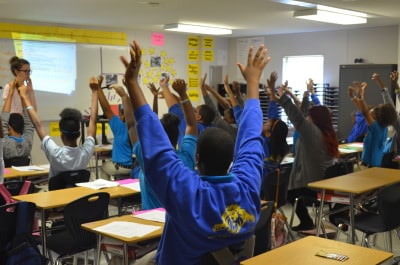
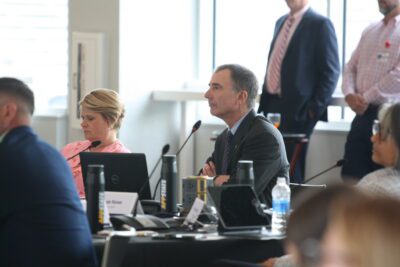
2024 annual charter schools report
CSRB members also discussed data from the new annual report, focusing on charter school growth and enrollment.
“Up until this last year, we had a steady trajectory of growth,” Baquero told the CSRB. “This previous year, 2024, was the first year we had a decrease (in schools) from the previous year.”
CSRB members discussed reasons for slower school growth, but clarified that student enrollment remains strong.
“We saw a dip in the number of schools,” Friend noted. “We’ve not seen a dip in enrollment… Enrollment is almost 10,000 more across the state.”
“We’ve had fewer applications over the last couple of years than we’ve had in the past,” he explained. “We’ve also had… fewer schools getting out of RTO.”
“There’s another element to this, too,” he added. “We’re cracking down,” he said, referring to CSRB oversight that has closed schools and also warned those in the renewal process that they are “down the pipeline of closure.”
In addition, OCS is seeing “a lot more delays” in opening, Baquero said. A primary obstacle to opening, CSRB members noted, is the difficulty in finding a facility.
CSRB members also discussed the possibility that some counties may be reaching a saturation point for charter schools, while other counties may need investment to catalyze growth.
“There are nearly 40 counties that don’t have a charter school,” said Eldridge. “I was shocked by that.”
The annual report shed light on reasons for this year’s downturn in schools, due to a confluence of these factors: five school closures and just two school openings.
According to the report, two charter schools (Veritas Community School and Apprentice Academy High School) relinquished their charters in 2024, while two others (Ridgeview Charter School and Children’s Village Academy) were not renewed.
Valor Preparatory Academy also relinquished its charter and closed at the end of this school year.
Meanwhile, just two new charter schools — ALA Monroe and Riverside Leadership Academy — opened in fall 2024.

Report figures also show that charter supply is not keeping pace with family demand at more than three-quarters of the state’s charter schools.
At the start of the 2024-25 school year, 74,287 students were on waitlists at 161 charter schools. Some names may be duplicates, the report noted, as students may be waitlisted at more than one charter school.

However, that waitlist backlog is down slightly from the previous year: In 2023-24, 85,551 students were on charter school waitlists, according to the 2023 Annual Charter Schools Report.
If all of the state’s charter students comprised a school district, only one district — Wake County Public Schools — would be bigger, the report noted.

Baquero also shared data on race and ethnicity in the state’s charter sector. Compared to district schools, charter schools serve a higher percentage of white, Black/African American, and Asian students — along with students of two more races.
Charter schools enroll a smaller percentage of Hispanic students than district schools do.
Percentages of American Indian and Pacific Islander students are roughly comparable at district and charter schools.

The annual report, which the CSRB approved, now goes to the State Board of Education and then on to the North Carolina General Assembly.
CSRB appointments
Membership on the CSRB is changing. At its June meeting, the State Board of Education approved CSRB appointments for Eric Sanchez and Eric Guckian.
This will be a second CSRB term for Sanchez, running from July 1, 2025, through June 30, 2029. Originally appointed to the CSRB in 2023, Sanchez is the founder and CEO of Henderson Collegiate.
Eric Guckian was appointed to fill the remainder of Alex Quigley’s unexpired CSRB term, which ends June 20, 2027. Guckian is the president and CEO of the United Way of the Greater Triangle and has worked for Teach for America, New Leaders, and KIPP (Knowledge is Power Program). He also served as senior education advisor to former North Carolina Gov. Pat McCrory.
In addition, the CSRB’s eight House and Senate appointments expire at the end of June, Baquero noted.

“We are working with the legislative liaison team here at DPI” on appointments, Baquero told the CSRB.
Other business
At the regular monthly meeting, Madeline Hannigan, the executive director of Great Schools North Carolina (GSNC), also shared a presentation with the CSRB about her organization’s work with charter schools. A nonprofit grantmaking organization, GSNC launched in 2024 with the mission of bringing “scale and quality to the charter sector by investing in forward-thinking education leaders.”
“We believe that great schools begin with strong leaders,” Hannigan told the CSRB. “When we invest in those leaders and their forward-thinking vision for their schools, we can help create the conditions to help each school be the best it can be to serve the kids that choose that school.”
“We were created to fill a very specific need here in the charter school landscape,” she added. “We are specifically a vehicle to galvanize significant philanthropy to support great schools across the state.”
That work has led GSNC to award more than $1 million in grants since its launch. Durham Charter School, Rise Charter School, and Pioneer Springs Community School have received school quality grants, which are available to leaders at existing charter schools. The Sledge Institute and West Triangle High School have been awarded startup grants.
GSNC’s 2025 school quality grant cycle will open in late August, Hannigan said. Startup grants will reopen in January 2026 and are intended for schools that secure preliminary CSRB approval. GSNC also supports aspiring charter applicants through a founder’s fellowship.
Along with funding, GSNC offers charter leaders targeted supports and programming and opportunities to build community.
As this month’s meeting concluded, Friend recognized outgoing CSRB member Bartley Danielsen, thanking him for his service. Danielsen, in turn, expressed appreciation for his colleagues.
“I’ve greatly enjoyed my interactions here, and I’ve just been extremely impressed with the staff here at OCS and also the other members of the board,” he said. “There are issues that (charter schools) are going to face going forward and landscapes are changing, but the leadership involved here is not something that they have to be concerned about.”
Over the summer, CSRB members will review charter applications, convening again for a regular meeting on Sept. 8-9, 2025.
Editor’s Note: EdNC has retained Kristen Blair to cover the monthly meetings of the Charter Schools Review Board in 2025. Kristen currently serves as the communications director for the North Carolina Coalition for Charter Schools. She has written for EdNC since 2015, and EdNC retains editorial control of the content.
Great Schools North Carolina supports the work of EdNC.
Recommended reading
